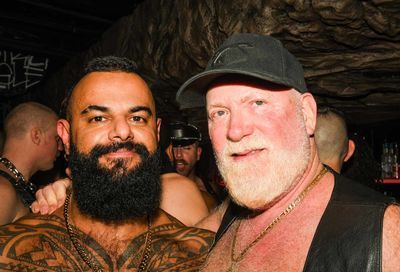Gay Sex Banned in South Korean Military
South Korea's constitutional court upheld a ban on consensual same-sex relations between soldiers in the armed forces.

In a ruling regarded as a setback for gay rights, South Korea’s constitutional court upheld a law banning same-sex relations within the country’s armed forces.
Under South Korea’s military criminal act, the penalty for same-sex relations is up to two years in prison for enlisted personnel.
That law has been challenged and upheld in court at least four times since 2002, reports Reuters.
Last Thursday, in a 5-4 ruling, the court said that allowing same-sex relations between individuals could undermine military discipline and impede readiness — arguments that have been used in other countries, including the United States, to justify banning LGBTQ individuals from serving.
LGBTQ activists had urged the court to overturn an “outdated and bad” law following a Supreme Court decision last year that overturned a military court’s conviction of two soldiers for a consensual same-sex relationship.
The two defendants — an army lieutenant and sergeant from different units — had been charged by military prosecutors for having sex during off-duty hours at an off-base residence in 2016.
Both were among nine soldiers indicted in a crackdown against gay soldiers in 2017. Both were found guilty and given suspended prison terms, which were initially upheld by the military high court before being appealed to the Supreme Court, reports The Guardian.
The Supreme Court ultimately decided, in that case, that the provisions prohibiting “anal intercourse” and “any other indecent acts” between military members should not be applied to consensual sex between male service members that takes place outside military facilities during off-duty hours.
The high court found that using the military criminal act to prosecute flings that meet such criteria jeopardizes the autonomy, equality, and dignity of soldiers.
Unlike the United States, South Korea has compulsory military service, in which all able-bodied men between 18 and 28 must serve between 18 and 21 months.
LGBTQ activists say that the use of the military criminal code to prosecute gay liaisons contributes to the stigmatization of gay soldiers, sometimes even resulting in violence and discrimination against them.
Civil rights groups lamented the constitutional court’s decision.
“This continued endorsement for the criminalization of consensual same-sex acts within the Korean military is a distressing setback in the decades-long struggle for equality in the country,” Boram Jang, Amnesty International’s East Asia researcher, said in a statement following the ruling.
“[T]he court’s decision to preserve article 92-6 unjustly casts LGBT soldiers as a threat to military readiness and sends a discriminatory signal that they are a problem for the armed forces,” Human Rights Watch wrote in a statement criticizing the ruling.
Human Rights Watch also called on South Korea’s National Assembly to take action to remedy the law, adding that “in the meantime, prosecutors should drop prosecutions for consensual same-sex conduct in the military and take concrete steps to promote equal treatment of LGBT soldiers.”
Support Metro Weekly’s Journalism
These are challenging times for news organizations. And yet it’s crucial we stay active and provide vital resources and information to both our local readers and the world. So won’t you please take a moment and consider supporting Metro Weekly with a membership? For as little as $5 a month, you can help ensure Metro Weekly magazine and MetroWeekly.com remain free, viable resources as we provide the best, most diverse, culturally-resonant LGBTQ coverage in both the D.C. region and around the world. Memberships come with exclusive perks and discounts, your own personal digital delivery of each week’s magazine (and an archive), access to our Member's Lounge when it launches this fall, and exclusive members-only items like Metro Weekly Membership Mugs and Tote Bags! Check out all our membership levels here and please join us today!


























You must be logged in to post a comment.